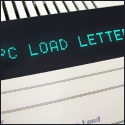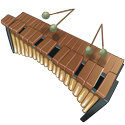|
KillHour posted:They have a bundle for their 4 fader module + their 16 encoder module which is exactly what I was going to buy but their website is broken and I can't add it to my cart I just bought this, too - seems very compelling price wise and once I read about the scripting and non midi features it seemed exceptionally worth it. Let's hope they are good!
|
|
|
|

|
| # ? May 14, 2024 17:28 |
|
Can anyone identify the synth used on the bassline on Beyonces' Love on Top? Model D? It sounds vaguely Moogish to my ears at least. https://www.youtube.com/watch?v=MthCZnf25QE
|
|
|
|
nielsm posted:I'm making some voice recordings for work, and getting some odd results. https://messageboard.tapeop.com/viewtopic.php?t=88776 You could use a phase rotator to fix it.
|
|
|
|
Before I contemplate coding one myself, is anyone aware of a good windows program that lets you use a midi controller to do stuff with your system? I'm thinking about changing system volume level, muting or unmuting, sending keystrokes, etc. I've seen some that send keystrokes, but I was hoping for a bit more than that.
|
|
|
Laserjet 4P posted:https://messageboard.tapeop.com/viewtopic.php?t=88776 Yeah I should have updated my post, I also talked to someone else afterwards, and got decently convinced that that's just how speech produces, especially when close to the mic. havelock posted:Before I contemplate coding one myself, is anyone aware of a good windows program that lets you use a midi controller to do stuff with your system? I'm thinking about changing system volume level, muting or unmuting, sending keystrokes, etc. I've seen some that send keystrokes, but I was hoping for a bit more than that. AutoHotkey with an add-on like this? https://github.com/dannywarren/AutoHotkey-Midi nielsm fucked around with this message at 17:45 on Mar 14, 2022 |
|
|
|
|
nielsm posted:Yeah I should have updated my post, I also talked to someone else afterwards, and got decently convinced that that's just how speech produces, especially when close to the mic. I didn't know the answer so I googled it and apparently yeah, being close to the mic can produce a pressure bias in one direction.
|
|
|
|
havelock posted:Before I contemplate coding one myself, is anyone aware of a good windows program that lets you use a midi controller to do stuff with your system? I'm thinking about changing system volume level, muting or unmuting, sending keystrokes, etc. I've seen some that send keystrokes, but I was hoping for a bit more than that. Bome MIDI Translator seems to be the go-to for this? Costs money though. There was a free one, but I forgot the name. Something-something DJ?
|
|
|
|
nielsm posted:
Oooh this looks like it'll scratch the immediate itch. free Trapt CD posted:Bome MIDI Translator seems to be the go-to for this? Costs money though. There was a free one, but I forgot the name. Something-something DJ? At least there's a free trial here to fiddle with. Thanks!
|
|
|
|
Can anyone recommend a good electronic/desktop EQ for my laptop? I listen to a lot of music on my computer while I'm working through headphones and while I run the signal through a tube preamp, sometimes I just want to tweak things a little bit. I travel fairly often so I often take my laptop with me without the preamp and listen to music on it, which is why I want a digital EQ I can just open up on my homescreen instead of an external/physical one. I don't want to spend a ton of money on it, but I am willing to pay if it's worth it/a reasonable price. Free is always better tho!
|
|
|
|
If you're on Windows there is Equalizer APO with the Peace GUI Also, if you're using headphones you can load EQ profiles for your specific set
|
|
|
|
Sorry if this has already been answered, or belongs someplace else, I didn't see anywhere better in my brief searching. I'm looking for recommendations for introductions to music fundamentals (for lack of a better description). For all intents and purposes, I know nothing about music, besides one year of band in middle school. I basically want something to teach me core terms and definitions, and hopefully give me a deeper explanation than what might be provided in an average "intro to [instrument]" book. To be more specific, certain musical terms frequently pop up in fairly normal contexts like notes, chords, octaves, tone, etc. A book I'm reading right now is talking about minor seconds, flatted fifths, going "through two and a half octaves", etc. I could Google each term I come upon, but I have been wanting to learn more and have a better understanding of music fundamentals. Ideally, I'd also like something that could also go a tad deeper to into mathematical/scientific explanations (if any exist, if that's even possible). For example, with notes A, B, C, etc, how are the actually separated, are they sound frequencies? Honestly I'm having a hard time describing what I'm looking for because I don't know enough to know what questions to ask. I guess, If you're familiar with "cooking for engineers", I'm kind of hoping for "music 101 for engineers".
|
|
|
|
pseudorandom posted:Sorry if this has already been answered, or belongs someplace else, I didn't see anywhere better in my brief searching. I know this is low effort but to get you pointed in the right direction: what you want to learn about is Music Theory. As for it having more of a mathematical bent, I learned most of what I know about sound in physics class, not music!
|
|
|
|
I would suggest piano or another keyboard instrument because most of what youíre asking is most easily visualized on one. As for how notes are determined and what frequencies they are, the Wikipedia articles about them are pretty readable imo. This one is good to start with: https://en.m.wikipedia.org/wiki/A440_(pitch_standard)
|
|
|
|
pseudorandom posted:Honestly I'm having a hard time describing what I'm looking for because I don't know enough to know what questions to ask. I guess, If you're familiar with "cooking for engineers", I'm kind of hoping for "music 101 for engineers". If you're after the real fundamentals you can try to understand the role of the harmonic series. Basically if something sounds like a musical note it's because the frequencies that make up the sound line up more or less with the harmonic series. Conversely non musical sounds have frequencies that don't line up with it. Andrew Huang has a pretty nice intro to it here https://www.youtube.com/watch?v=Wx_kugSemfY
|
|
|
|
I really like "How Music Really Works" by Wayne Chase. It's a little windy at times, but covers the physics and then builds Western music theory on top of that, eg explaining why we have the notes we do, why scales are constructed as they are, why we divide time, and then gets into harmony and melody and songwriting using those blocks. I found it very helpful for getting "the language" to then help understand other materials. (The publisher sells direct; gently caress Amazon.) Also don't forget that applying knowledge is a critical part of learning.
|
|
|
|
Hawkperson posted:As for how notes are determined and what frequencies they are, the Wikipedia articles about them are pretty readable imo. This one is good to start with: https://en.m.wikipedia.org/wiki/A440_(pitch_standard) You're gonna love how the modern western scale is determined: just multiply each frequency by 2^(1/12) to get the next half step up.
|
|
|
|
cruft posted:You're gonna love how the modern western scale is determined: just multiply each frequency by 2^(1/12) to get the next half step up. Yeah, we went through centuries of fiddling about with different compromises, making the thirds a little sweeter at the cost of the fifths and so on, and then just went "gently caress it, just divide the octave by twelve that's good enough."
|
|
|
|
We still use different tunings in various contexts. A choir singing a capella sings in just intonation, they donít bother trying to align with a piano unless theyíre singing with one. It came up once in the music theory thread but Iím deeply curious if fretless bass players play in just intonation or not; I donít see why they wouldnít but if theyíre playing with fretted instruments/piano then I imagine they would necessarily adjust. When you learn a wind instrument at a high level you learn which notes on your instrument are built out of tune because physics makes it impossible to build one that fits ANY tuning system. Thatís why clarinets have so many keys, itís an attempt to work around it as much as possible, but the instrument still has some bad notes. Donít even get me started on trumpets lol. Anyway tuning systems are a fun rabbit hole just like most music things. I really want to learn more about ragas someday, the concept is so different from western theory and it seems so cool
|
|
|
|
Hawkperson posted:We still use different tunings in various contexts. A choir singing a capella sings in just intonation, they don’t bother trying to align with a piano unless they’re singing with one. It came up once in the music theory thread but I’m deeply curious if fretless bass players play in just intonation or not; I don’t see why they wouldn’t but if they’re playing with fretted instruments/piano then I imagine they would necessarily adjust. I'm using just intonation for the electronic bagpipes I'm building, because I am a huge nerd and I think this sort of stuff is cool.
|
|
|
|
timp posted:I know this is low effort but to get you pointed in the right direction: what you want to learn about is Music Theory. As for it having more of a mathematical bent, I learned most of what I know about sound in physics class, not music! Ahh, that makes sense. Definitely helpful, thanks. Hawkperson posted:I would suggest piano or another keyboard instrument because most of what youíre asking is most easily visualized on one. As for how notes are determined and what frequencies they are, the Wikipedia articles about them are pretty readable imo. This one is good to start with: https://en.m.wikipedia.org/wiki/A440_(pitch_standard) I haven't gotten back to this yet, but it looks good. I'll definitely read it over later. I only understood like half of this, but just seeing that spectrum analyzer demonstration blew my mind. Seeing that instruments are actually playing the same fundamental note, even though they may sound different, has already helped notes make more sense to me. ColdPie posted:I really like "How Music Really Works" by Wayne Chase. It's a little windy at times, but covers the physics and then builds Western music theory on top of that, eg explaining why we have the notes we do, why scales are constructed as they are, why we divide time, and then gets into harmony and melody and songwriting using those blocks. I found it very helpful for getting "the language" to then help understand other materials. (The publisher sells direct; gently caress Amazon.) I was not expecting such a large book, but I saw the publisher has some real good bundle discounts going on, so I grabbed one. That looks like it will probably be exactly what I was looking for. I think that combined with a super simple intro book to cover basic definitions will be perfect. Thanks for the help everyone 
|
|
|
|
Can I get a link to the music (instrument/making/recording/etc) discord, please? E: v thank you! zelah fucked around with this message at 20:07 on Apr 24, 2022 |
|
|
|
zelah posted:Can I get a link to the music (instrument/making/recording/etc) discord, please?
|
|
|
|
Good lords I keep confusing myself and I feel like I'm going to rip out what little hair I have left. Someone please explain this to me as I think I've been understanding thing incorrectly. I have an amp head (200watts), and I have a 2x12 cabinet (60w+60w=120watts). I'm adding an additional cabinet to my setup, a 2x15 (200watts+150watts=300watts). All speakers are all 16Ω and wired in parallel, so each cabinet is being treated as being 8Ω. Sensitivity for each speaker is within 2db of each other. My amp has two cabinet outputs rated at 4/8Ω, I know I can run both cabinets at 8Ω and have no issues in regards to impedance per the manual. What I don't know however is if my amp is powerful enough to run these 4 speakers safely. I don't know if I'm supposed to treat each cabinet output on the amp as 200watts, or if each output is rated at 100watts at 8Ω for a total of 200watts as some others are. I do see the following in my manual:
Now, from what I understand it's normally recommended to have around twice as much amplifier power compared to a speakerís power rating (according to google at least) so as to be able to supply continuous power. Does that mean that optimally I should only be looking for 100watt speaker cabinets if I want to run 2 cabinets 24/7? That seems... off.
|
|
|
|
Speaker ratings are maximum wattages. The coil inside will burn out if you overload it. The ratings on amplifier outputs are recommended minimums, to ensure you have beefy enough speakers.
|
|
|
|
Would anyone know why some of my plugins appear tiny in Reason? Specifically I've found it to be an issue with the Soundtoys plugins and iZotope Ozone. The Arturia V Collection has resizable windows, so it hasn't been an issue with those. But with the Soundtoys plugins, those don't have a resize option so they're in really small little windows and it's hard to read the text on them. Same goes for Ozone. I was using Ozone 8 and the text in the Maximizer (like the peak/RMS numbers) were really hard to read, and I saw that Ozone 9 had resizability so I upgraded to 9, but even with resizing the window, the numbers are still really hard to read  This has been happening since I upgraded to Reason 12, because prior to that, I'd been using plugins in Reason for years without this issue. I'm using Reason 12 (running the latest update) on Windows 11 Pro and I have a 4K monitor. I wish I had another DAW so I could see if this is an issue there too but I don't.
|
|
|
|
Reaper freeware is a quick install if you just wanna check looks like you're not the only one having problems though: https://help.reasonstudios.com/hc/en-us/articles/4416355436946-My-VST-panels-are-too-small-in-Reason-12-2-4-on-Windows
|
|
|
|
My small question is: how does Reverb paying you work? I assume it's held til they get the thing? What about shipping?
|
|
|
|
JamesKPolk posted:Reaper freeware is a quick install if you just wanna check 
|
|
|
|
JamesKPolk posted:My small question is: Generally they send you funds after the item has legitimately shipped. I typically purchase shipping labels through them, so there might be some further delay if you buy one independently. Oh, hah. This is the more definitive guide: https://help.reverb.com/hc/en-us/articles/360002778613-How-to-Get-Paid-with-Reverb-Payments-
|
|
|
|
also posted in the Bass thread, but i guess it's not bass-specific. for background, I read music (high school band nerd) but am frequently puzzled by the things i see in rhythm charts. what is meant by the following on a rhythm/lead sheet for a piece of music i'm supposed to learn: "Bass - soft upper range diamonds." ? it occurs to me that this might be included in some assumed fundamentals i've missed since this stuff isn't in band literature. a follow-up question: is there a guide to reading rhythm charts i should read/learn first?
|
|
|
|
In my experience, playing diamonds is playing chords on the one beats only. For bass, I would guess play just the root note on the one beat and in this case somewhere higher up on the neck
|
|
|
|
diamonds/footballs/eggs/etc is a reference to the shape of the note heads for whole notes things like this arenít fundamentals and arenít technically correct (just write out the notes), theyíre things players say in rehearsals/on recording sessions thatíve been colloquially added to the vernacular
|
|
|
|
Jazz Marimba posted:diamonds/footballs/eggs/etc is a reference to the shape of the note heads for whole notes there aren't any note heads shaped like that for like 50 measures after that instruction appears. Jazz Marimba posted:things like this arenít fundamentals and arenít technically correct (just write out the notes), theyíre things players say in rehearsals/on recording sessions thatíve been colloquially added to the vernacular i was afraid of that! thanks! nine16thsdago fucked around with this message at 15:24 on May 17, 2022 |
|
|
|
nine16thsdago posted:there aren't any note heads shaped like that for like 50 measures after that instruction appears. since you said itís a rhythm chart/lead sheet, iím guessing itís got time slashes or the melody. text instructions like that are meant to supersede any written material as they were likely added during the rehearsal process, after the chart was written can you post a picture of the chart?
|
|
|
|
Jazz Marimba posted:since you said itís a rhythm chart/lead sheet, iím guessing itís got time slashes or the melody. text instructions like that are meant to supersede any written material as they were likely added during the rehearsal process, after the chart was written in the pic is the song intro which is actually written out in a split staff (which is why i'm wondering what i'm missing). after this it's all slash notation until the bridge-ish. so it seems like the bass staff is what i should play, except 8va? if so, why not just write that? 
|
|
|
|
nine16thsdago posted:so it seems like the bass staff is what i should play, except 8va? if so, why not just write that? As an idiot composer, may I posit that the composer is just an idiot?
|
|
|
|
Did someone say my name?
|
|
|
|
I heard the thread was looking for idiot composers? Well, here I am.
|
|
|
|
there are full-time jobs that take the idiot composer's printed out MIDI and make it playable by human beings
|
|
|
|

|
| # ? May 14, 2024 17:28 |
|
yeah sheet music engraving is its own thing and I wish I were better at it myself
|
|
|













 ~*
~*























